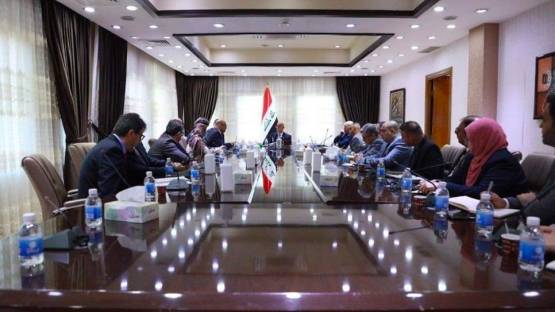Iraq Makes Progress in Improving Cancer Services, Implements imPACT Review Recommendation
First day meeting hosted by His Excellency the Minister of Health with leading Iraq cancer stakeholders, the IAEA National Liaison Officer Mr Majid Al-Saeedi, the WHO Country Representative Dr Ahmed Zouiten, WHO Regional Office for Eastern Mediterranean NCDs Regional Advisor Dr Lamia Mahmoud and the imPACT Review expert team discussing key imPACT Review recommendations and strategic steps to advance cancer control strategy in Iraq.
Iraq has made progress in implementing recommendations from a 2021 IAEA-IARC-WHO imPACT review aimed at improving comprehensive cancer control in the country, according to the findings of a follow-up review conducted in the country last month. Progress has included improving coordination between the Iraqi Cancer Board and the Ministry of Health Noncommunicable Disease Unit, and the adoption of a Ministerial decree to facilitate opioid prescription for terminally ill patients. The country also confirmed its intention to develop a national cancer control strategy and plan.
Health authorities in Iraq have been working to implement the 2021 recommendations by the IAEA, the World Health Organization (WHO) and the International Agency for Research on Cancer (IARC) experts. The review was carried out on request of the government to assess the country’s progress, particularly in the areas of cancer diagnosis and treatment and childhood cancers. The review findings will be used to further guide the Ministry of Health toward setting further priorities related to cancer.
“Strengthened cancer management is one of the highest healthcare priorities in the country,” said Saleh Mehdi Mutalib, Iraq’s Minister of Health. “Iraq needs to develop a holistic, realistic and practical approach, in accordance with established guidelines and subject to availability of essential medicines and technology. It requires a multi-disciplinary approach, and inclusion of psycho-social support for patients and families.”

imPACT Review radiation oncology expert Dr Yavuz Anacak (right) discussing cancer care infrastructure in Mosul with the Ministry of Health cancer focal point Dr Musaib Khadim Alabboodi and WHO staff responsible for the Nineveh Governorate.
Some of the most urgent challenges facing the country in cancer care – found in the 2021 imPACT Review and the 2023 follow-up country mission – include non-operational equipment and a lack of cancer treatment guidelines, together with workforce shortages and limited education and training.
“Iraq needs to put in place a five-year cancer plan,” said Dr Musaib Khadim Alabboodi, the cancer care/management focal point at the Ministry of Health. “This should cover all areas of cancer control, from prevention to palliative care, and should identify priority training needs.”
Following on from the initial review recommendations, the Ministry of Health nominated five candidates for IAEA technical cooperation fellowships, each of whom completed a one-month hands on multidisciplinary fellowship training course in radiation oncology and medical physics in advanced radiation therapy. The candidates also received hands-on clinical experience at cancer care centres in Türkiye and Jordan, with the help and guidance of international experts. Two-week scientific visits were organized to Izmir, Türkiye, affording the opportunity for Iraqi experts to see first-hand the resource allocation, management and mobilization approaches, private sector outreach and care delivery models used by their peers at the Ege University Hospital’s Department of Radiation Oncology in Türkiye.
Several further three month-long fellowships are currently underway at KHCC to build capacity in medical physics, radiation safety and radiation oncology. Upon the completion of their fellowships, the experts are expected to return to their home institutions in Iraq, bringing with them the ability to implement new techniques, apply advanced standards and clinical procedures, and share their enhanced skills with local radiotherapy professionals.
"Developing the Iraq cancer strategy in alignment with national SDG goals is crucial. The results of this follow-up imPACT review will contribute to defining the success metrics for cancer management in Iraq," said Dr Ahmed Zouiten, WHO Country Representative for Iraq.
The follow-up imPACT Review mission team visited over 15 hospitals, clinics and other facilities, and met key policy makers, clinicians and support staff in Baghdad, Erbil and Mosul.






